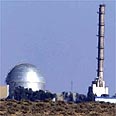
Dimona nuclear reactor (Archives)
צילום רויטרס
Experts: Israel should prepare nuclear reactor for quake
Israeli scientists say that if Japan can be shaken up by earthquake, it is sure sign that Israel should seismically strengthen its buildings – especially nuclear reactor, which was built in '50s
In the aftermath of the devastating earthquake that killed thousands and caused massive damage in Japan, experts assert that Israel should take the necessary measures to prepare for a similar event.
"Japan was greatly prepared for such a scenario," Dr. Uri Friedlander of the Geophysical Institute of Israel told Ynet. "This could be seen in the durability of the buildings, and in the fact that most of the damage was caused by the tsunami."
While the buildings in Japan withstood the 8.9-magnitude quake, the damage caused to the nuclear plant in Fukushima raised fears of a radiation leak – something that Dr. Ron Avni, a geology professor at Ben Gurion University says that Israel should take notice of.
"Our nuclear reactor was founded and built in the '50s," he said. "What is known today about geology and earthquakes wasn't known then."
Avni warned that the reactor, which is located near the southern Israeli city of Dimona, was built too close to the Great Rift Valley.
"Experts knew back then that the region was a source of earthquakes, but they were unaware exactly to what degree," he said. "It was discovered since then that the rift forms a border between two tectonic plates, and that their relative movement reaches five to seven millimeters a year, on average."
'State can't afford to prepare for quake'
According to Avni, strong quakes occur in the region approximately once a century; the last tremor took place in 1927. "How (sturdily) the reactor was built, or reinforced over the years against a strong earthquake that is expected in the area? Many, including me, don't know the answer," he said.Experts say that if Japan, a nation that is considered to be well-prepared for destructive tremors, can still be caught by surprise when such an event hits, Israel has a reason to worry – even though the strongest quakes that shake up the region are much less powerful then those that can occur in Japan, or even in California.
So does Israel take the necessary precautions? Avni said that Israel is much better prepared for a quake than it was a decade ago. In 1980, guidelines were was put in place that required structures to be built to withstand quakes, and the built-in protected spaces and elevator shafts are known to reinforce durability. But as always, it all comes down to the bottom line.
"The State cannot afford, financially, to prepare for an earthquake stronger than is expected in the region; the cold cost-benefit analysis leaves no other choice," Avni said. "Legislation should implement the national planning guidelines for seismic strengthening across the country, including in the periphery."
- Follow Ynetnews on Facebook










